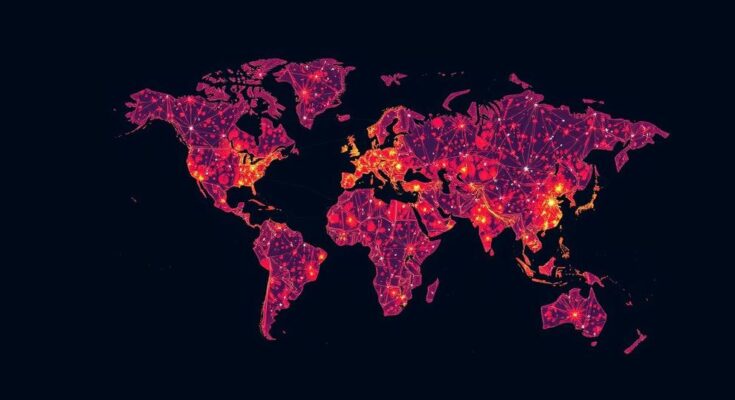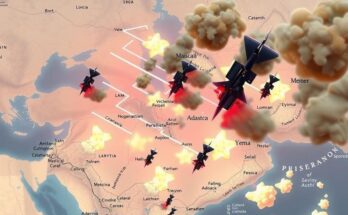As the US approaches a crucial presidential election, the outcome will determine the future of international relations, particularly concerning military alliances, trade relations, and the US’s role in global conflict resolution. Kamala Harris is expected to uphold current policies, while Donald Trump may lean towards isolationism, raising concerns among global leaders about the stability of NATO and international diplomacy.
As the United States approaches its presidential election, the outcome may significantly influence global dynamics. President Joe Biden’s visit to Kyiv to support Ukraine highlighted America’s role on the world stage, yet uncertainty looms over whether Kamala Harris will continue his policies or if Donald Trump will pivot towards a more isolationist stance. The upcoming election is framed against a backdrop of complex international relationships, rising autocratic regimes, and multiple ongoing conflicts, including those in Gaza and Ukraine. Observers such as Rose Gottemoeller, former Deputy Secretary General of NATO, express deep concern about Trump’s potential victory, reiterating that “Donald Trump is Europe’s nightmare” due to his unpredictable military policies and threats regarding NATO expenditure. Harris’s victory may indicate a commitment to continuing support for NATO and Ukraine, but internal political pressures could limit expansive foreign aid, regardless of the eventual president. The geopolitical landscape remains precarious, as noted by Comfort Ero, president of the International Crisis Group, who acknowledges the US’s diminished capacity to mediate conflicts amid an era of great power rivalry and increasing global volatility. Harris’s consistent support for Ukraine contrasts sharply with Trump’s inclination to strike deals with authoritarian figures, including possible concessions to Russia on Ukraine. American relations with China also hang in the balance, with potential tariffs introduced under Trump’s administration signaling a shift in trade dynamics, whereas Harris may pursue more predictable diplomacy. The handling of climate change strategies is another critical issue, with Mary Robinson of the Elders emphasizing the necessity for strong leadership, particularly in light of Trump’s previous dismissals of environmental policies. In humanitarian areas, the US’s ability to provide moral leadership is at stake, noted by Martin Griffiths, a former UN official, who stresses that the world seeks a principled approach from the US amid ongoing global crises. In conclusion, the upcoming election is not merely a national affair but one with substantial implications for international stability, military alliances, trade relations, climate action, and humanitarian efforts. The decision made by American voters will resonate across borders, shaping the future of global cooperation and conflict resolution.
The influence of the United States on global matters is increasingly contested, with regional powers mounting their own solutions to international issues. The November election could lead to a substantial shift in how the US engages with international allies, particularly regarding defense commitments, conflict resolution, and trade relations. The dynamics within NATO and the strategies toward adversaries such as China and Russia will significantly depend on whether voters elect Kamala Harris, who favors multilateral engagement, or Donald Trump, who advocates for an isolationist approach. The situation emphasizes the high stakes involved, not only for the American populace but also for the stability of worldwide interactions.
The upcoming US presidential election holds profound implications for international relations, military alliances, economic policies, and humanitarian efforts. The potential victory of either Kamala Harris or Donald Trump could lead to divergent paths that would affect global stability. Harris’s continuity in policy may reinforce existing alliances and commitments, while Trump’s isolationist tendencies could disrupt long-standing partnerships and alter the US’s role as a global leader in significant ways. The world watches closely, awaiting the electorate’s decision.
Original Source: www.bbc.com




